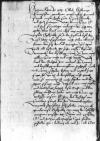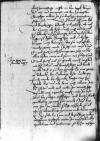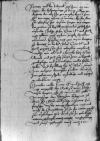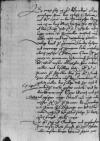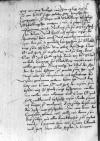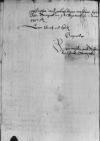Wyr konnen Ewer G(enade)n und Her(lichkei)t(en) fruntlicher wolmehn(un)ge / nicht vorhalt(en), / das dweil wir / biss noch anher / aws unsern geschickt(en) / so in die zcusane(n)kunft der ause stet(en) afgefertiget / nicht haben abneme(n) konnen, / das sich der ⌊lub(ischen)⌋ vornehme(n) / zcu eyne(n) fride ad(er) bestande hot zcihen well(e)n. / Besund(er) vormerck(en), / das diselbig(en) lewt(en) / in irem muth willen / ymer mehr und mehr wutt(en) / unde dweil dan / sulcher irer mutwil / der ⌊Cronen⌋ / und derselbig(en) underworffenen herschaft, / landt und lewt(en) / schaden, / beswer und nochteil zcugefuget hot. / Ya och do demselbig(en) nicht gerot(en) wirt / zu vormut(en) ist / mehr schaden / und boschwer zufugen muge. / Whoru(m)b wir / noch reiff(em) und weitloftig(en) beweg(en) / diser sachen / und derselbig(en) um(m)bstant haben wir nicht konnen achterlossen / unserm g(gnedige)n hern, dem ⌊bisschof von Ermelant⌋, / sampt dem hern ⌊marienburgschem woywode⌋ / schriftlich zutzustellen, / wes sich obgemelte unso geschickt(en) / von weg(en) der lubisch(e)n vornehmen / vorsehen tet(en). /
Dovon wir och Ew(e)rn G(enade)n und Her(lichkei)t(en) ein gleichmesige copie hirbey zcustellen thun, / dodurch als wol ir / als Ewer  BCz, 1624, p. 106 G(enade)n und Her(lichkei)t(en) so vil destebas / bey sich / was uns notigk / zu thun / mog(en) zu bedencken haben. / Dorneben och Iren G(enade)n und Her(lichkei)t(en) geschriben, / das wir vor guth ansegen / ⌊koniglicher hidden by binding⌈[cher]cher hidden by binding⌉ ma(ieste)t⌋, unser all(er)g(nedig)ste herre, / sampt ⌊sein hochwirdigsten rehten⌋ / durch Ewer G(enad)e sampt den andern hern rethen / ⌊diser land(en)⌋, / so itczu(n)t bey ko(nigliche)r ma(ieste)t hof zu sein vormerckt werden angetret(en) wurde / und das ire ma(ieste)t / wir sich der ⌊lubischen⌋ vornehmen erstreckt / vorogen gestalt wurde / den was schaden, / die ⌊Cronen⌋ / und derselbig(en) underworffenen land(en) durch die krige, / so die lubischen erweckt / erlitt(en) hot. / Ist wol tzu bedencken / alle gelider / derselbtig(en) thun sulchs superinscribed⌈sulchssulchs superinscribed⌉ fulen, / wehs sie aber / do diselbig(en) hidden by binding⌈[g(en)]g(en) hidden by binding⌉ krige lenger daroren und wer(en) sult(en) / noch geber(en) mucht(en) / hot ein ider vorstendig(er) leichtlich bey sich zcu erfind(en). /
BCz, 1624, p. 106 G(enade)n und Her(lichkei)t(en) so vil destebas / bey sich / was uns notigk / zu thun / mog(en) zu bedencken haben. / Dorneben och Iren G(enade)n und Her(lichkei)t(en) geschriben, / das wir vor guth ansegen / ⌊koniglicher hidden by binding⌈[cher]cher hidden by binding⌉ ma(ieste)t⌋, unser all(er)g(nedig)ste herre, / sampt ⌊sein hochwirdigsten rehten⌋ / durch Ewer G(enad)e sampt den andern hern rethen / ⌊diser land(en)⌋, / so itczu(n)t bey ko(nigliche)r ma(ieste)t hof zu sein vormerckt werden angetret(en) wurde / und das ire ma(ieste)t / wir sich der ⌊lubischen⌋ vornehmen erstreckt / vorogen gestalt wurde / den was schaden, / die ⌊Cronen⌋ / und derselbig(en) underworffenen land(en) durch die krige, / so die lubischen erweckt / erlitt(en) hot. / Ist wol tzu bedencken / alle gelider / derselbtig(en) thun sulchs superinscribed⌈sulchssulchs superinscribed⌉ fulen, / wehs sie aber / do diselbig(en) hidden by binding⌈[g(en)]g(en) hidden by binding⌉ krige lenger daroren und wer(en) sult(en) / noch geber(en) mucht(en) / hot ein ider vorstendig(er) leichtlich bey sich zcu erfind(en). /
Sulten och die ⌊lubischen⌋ / itczund(er) einen andern konigk aufwerffen / und in ⌊Dennemarck(en)⌋ setczen / were(?) leichtlich zu ermessen, / wes wir uns / und al / die hinder gesessenen landen / desselbig(en) nockberschaft / zu frewen hett(en). / Dweil wir den itczi hidden by binding⌈[i]i hidden by binding⌉gen / so al superinscribed⌈alal superinscribed⌉ Dennemarck(en) / auf etzliche stette noch geweltig ist / gefurdert haben. / Sund(er)lich hett(en) wir uns weinig guts zu vorsehen / zcu Phaltz / Bremen Fridrich / doman vil itczunt redt /  BCz, 1624, p. 107 doch gruntlichs nichts an den tagk kompt der / wie ma(n) vornympt / mit dem ⌊homeister dewtschen ordens⌋ / im sunderlich(e)m vornehmen stehen sal. / Und dweil nuh / aws dise(n) und dergleichem bedenck(en) und gelost(en), / als wol der ⌊Cronen⌋ / als ⌊disen land(en)⌋ / nicht weinig / wil zcu bedenck(en) und zcu betracht(en) kom(m)en / und sunderlichen, / so dysen deniyschen und lubischen krygen / nicht dermosen, / das sie aufgehaben wurd(en) / gerot(en) wirdt. / So sehe wir / auf Ew(e)r G(enade)n und Her(lichkei)t(en) vorbesserunge / vor guth an / dis alles bester weis und form, wie sulchs Ew(e)r G(enade)n und Her(lichkei)t(en) ires hog(en) vor standes noch on the margin⌈ires hog(en) vor standes nochires hog(en) vor standes noch on the margin⌉ wol zu thuende werd(e)t wissen mit ⌊ko(nigliche)r ma(ieste)t⌋ wol beratschlaget und beredt wurde / und yo zcu dem grunde / so aws gemeÿne(n) bedenck(en) / der ordenu(n)ge ⌊diser lande⌋ gefund(en) wurde / bey obgemelt(en) sachen / was zcu thunde / das ma(n) als denne nicht alleine / irer ko(nigliche)n ma(ieste)t radt und willen / im vorroth hette / besund(er) auch eigentlich wust(en), / was ire ko(niglich)e ma(ieste)t / bey sulchem aufsetczen / und dartzu streck(en) genediglich gewog(en) sein wurde. / Auf das wir hier im ⌊lande⌋ / sulchs wissende, / so vil ehr / zu abwendunge gemeiner nodt / kom(m)en mocht(en) / dan sulte die ⌊Cron⌋ und derselbtig(en) underworffenen herschaft / weiter im aufschub / aller handelunge und hanttirunge, / so bisher gescheen
BCz, 1624, p. 107 doch gruntlichs nichts an den tagk kompt der / wie ma(n) vornympt / mit dem ⌊homeister dewtschen ordens⌋ / im sunderlich(e)m vornehmen stehen sal. / Und dweil nuh / aws dise(n) und dergleichem bedenck(en) und gelost(en), / als wol der ⌊Cronen⌋ / als ⌊disen land(en)⌋ / nicht weinig / wil zcu bedenck(en) und zcu betracht(en) kom(m)en / und sunderlichen, / so dysen deniyschen und lubischen krygen / nicht dermosen, / das sie aufgehaben wurd(en) / gerot(en) wirdt. / So sehe wir / auf Ew(e)r G(enade)n und Her(lichkei)t(en) vorbesserunge / vor guth an / dis alles bester weis und form, wie sulchs Ew(e)r G(enade)n und Her(lichkei)t(en) ires hog(en) vor standes noch on the margin⌈ires hog(en) vor standes nochires hog(en) vor standes noch on the margin⌉ wol zu thuende werd(e)t wissen mit ⌊ko(nigliche)r ma(ieste)t⌋ wol beratschlaget und beredt wurde / und yo zcu dem grunde / so aws gemeÿne(n) bedenck(en) / der ordenu(n)ge ⌊diser lande⌋ gefund(en) wurde / bey obgemelt(en) sachen / was zcu thunde / das ma(n) als denne nicht alleine / irer ko(nigliche)n ma(ieste)t radt und willen / im vorroth hette / besund(er) auch eigentlich wust(en), / was ire ko(niglich)e ma(ieste)t / bey sulchem aufsetczen / und dartzu streck(en) genediglich gewog(en) sein wurde. / Auf das wir hier im ⌊lande⌋ / sulchs wissende, / so vil ehr / zu abwendunge gemeiner nodt / kom(m)en mocht(en) / dan sulte die ⌊Cron⌋ und derselbtig(en) underworffenen herschaft / weiter im aufschub / aller handelunge und hanttirunge, / so bisher gescheen  BCz, 1624, p. 108 gehalt(en) werd(en). Ist bey iderme(n)niglich leichtlich zu erfind(en) / wie treglich sulchs den eynwonern derselbig(en) / sein wurde.
BCz, 1624, p. 108 gehalt(en) werd(en). Ist bey iderme(n)niglich leichtlich zu erfind(en) / wie treglich sulchs den eynwonern derselbig(en) / sein wurde.
/ Nuh / unsers genedig(en) hern, / des hern ⌊bisschofe vo(n) Ermelant⌋, / auf sulchs unser bewegen bedenck(en) sey, / das werd(en) Ewer G(enade)n und Her(lichkei)t(en) aws beigelegten / irer g(nade)n brief zcu vornehme(n) haben, / bey welchem ire g(nad)e uns geschrieben hot, / das er / obangeczeigte unser sorgfeltickeit / unde bedenck(en) beyfelt / und synnet sulchs an Ewer G(nade)n und Her(lichkei)t(en) weiter zustellen, / wie Ewer G(nade)n und Her(lichkei)t(en) sulchs aus beygelegte(m) copien / der briven, / so ire g(nad)e an uns derweg(en) hot ergehen lossen / werdet zu vornehmen haben.
Wir haben och, Genedigen und Groshunstige Herre, nicht vor unguth geachtet, das die schmohe und vorclegunge, / so den ⌊hern reten superinscribed⌈retenreten superinscribed⌉ diser land(en)⌋ durch her ⌊Stenzel Kostke⌋ boirgenet. / Itzund(e)r bey ⌊ko(nigliche)r ma(ieste)t⌋ / gedocht wurde / und der abtrag / so derwegen billich dem lande folgen sall / bey irer Ma(ieste)t beschlossen / und alhier im lande / den rethen zcu thunde / her Kostk(en) auferlegt wurde, / dan vor wore / unsers erachtens / sulchs hinder der ⌊rethe diser lande⌋ vorcleinu(n)ge / und gutter estimation nicht vorbleiben kan.
Wes wir aber von wegen der nhom, / so unsern burger / durch slegel / zwuschen den grentzen  BCz, 1624, p. 109 ⌊Pomern⌋ und der ⌊Marck⌋ gescheen / och von wegen / der beschatczunge, / so durch / seliger gedechtnis den alt(en) in Got vorstorbenen ⌊churf(urs)t⌋ / von weg(en) eynes fuerma(n)s / der die strosen uberfar(en) hett / unserm burger / von wegen den guttern, / so derselbtige fuerma(n) gelad(en) hot / auferlet. / Sulchs haben Ewer G(enade)n / und Her(lichkei)t(en) nicht alleine / aws unserm jungst(en) schreiben / vornomen, / bsunder auch / van unsen burgern, / szo derweg(en) an die ko(nigliche)r ma(ieste)t / Ewer G(enade)n und Her(lichkei)t(en) geczog(en) sein / zcur uberflus vorstand(en). Welche wir ab(er) und abermols bitt(en) Ew(e)r Genade und Her(lichkei)t(en) / sich sampt irem anligentt / genediglichen und freuntlichen / wellet b<e>folen haben / und diselbtig(en) bey ⌊ko(nigliche)r ma(ieste)t⌋ / sampt irem anligent / dermoszen fordern, / domit sie irer gelittenen scheden / erstattu(n)ge und ergetzu(n)ge uberkom(m)en mocht(en).
BCz, 1624, p. 109 ⌊Pomern⌋ und der ⌊Marck⌋ gescheen / och von wegen / der beschatczunge, / so durch / seliger gedechtnis den alt(en) in Got vorstorbenen ⌊churf(urs)t⌋ / von weg(en) eynes fuerma(n)s / der die strosen uberfar(en) hett / unserm burger / von wegen den guttern, / so derselbtige fuerma(n) gelad(en) hot / auferlet. / Sulchs haben Ewer G(enade)n / und Her(lichkei)t(en) nicht alleine / aws unserm jungst(en) schreiben / vornomen, / bsunder auch / van unsen burgern, / szo derweg(en) an die ko(nigliche)r ma(ieste)t / Ewer G(enade)n und Her(lichkei)t(en) geczog(en) sein / zcur uberflus vorstand(en). Welche wir ab(er) und abermols bitt(en) Ew(e)r Genade und Her(lichkei)t(en) / sich sampt irem anligentt / genediglichen und freuntlichen / wellet b<e>folen haben / und diselbtig(en) bey ⌊ko(nigliche)r ma(ieste)t⌋ / sampt irem anligent / dermoszen fordern, / domit sie irer gelittenen scheden / erstattu(n)ge und ergetzu(n)ge uberkom(m)en mocht(en).
Hirneben wellen Ewer G(enade)n und Her(lichkei)t(en) och nicht vorgessen / den radt / so vorm jaere unsen burgern als sie von ⌊Lublin⌋ geko(m)en im ausczuge / von ⌊Warszaw⌋ bojegenet ist domit ⌊ko(niglich)e ma(ieste)t⌋ / um(m)b sulche misteters zcu forschen / unsers vorig(en) schreibens noch / nus(?) ernste den amptlewt(en), / so in den ortern gesessen / auferlegen thun. / Domit sie / in geburlich(e)n ortern gestrafe werd(en) mocht(en) vorhaftunge und strof / gebrocht werd(en) mochten.
 BCz, 1624, p. 110
BCz, 1624, p. 110
Es tragt sich och / zcu Genedig(er) und Grosgunstigen / Hern, / das etzliche edelewte so wol ⌊ko(nigliche)r ma(ieste)t⌋ an den pomerrschen grentznen, wie och an denselbtig(en) ⌊hertzog⌋ thun gesessen al das ring vihe / so in ⌊Casschuben⌋ und etzlichen ortern vo(n) ⌊Pomerellen⌋ / vorhand(en) / aufgetriben wirt / und noch ⌊Wittenburg⌋ getriben. / Welchs dweil zu gemeyne(n) landes beschwer und tewrunge, / och gemeyner leibs enthaltu(n)ge abroch / geschit.
Bitten wir Ewer G(enade)n Her(lichkei)t(en) gemeynen eynwonern ⌊diser land(en)⌋ zum best(en) ⌊ko(niglich)e ma(ieste)t⌋, unsern all(er)g(nedig)sten hern, antret(en) willet / und diselbige bitt(en) / ⌊f(urstlich)e ir(lauch)t zu Pomern⌋ zu schreiben, / das ire f(urstlich)e genade irem amptma(n)ne auf der ⌊Lawenburgk⌋ gebitt(en) wollet, / das sulchs vihe hier auss de(r) lande / nicht on the margin⌈nichtnicht on the margin⌉ zu treib(en) gestat wurde / und dys duncket uns / auf Ewer Genad(en) und Her(lichkei)t(en) vo(r) bessern on the margin⌈vo(r) bessernvo(r) bessern on the margin⌉ wol gescheen moge. / Dweil wir nicht and(er)s wissen / ⌊f(urstlich)e ir(lauch)t zu Pomern⌋ / die ⌊Lawenburg⌋ und ⌊Butow⌋ zcu lehnrechte / von ⌊ko(nigliche)r ma(ieste)t⌋ halte. / Whoru(m)b ⌊ko(niglich)e ma(ieste)t⌋ sulchs zu beger(en)(?) gut(en) fuegk hab(en) moge. /
Es hot sich och Genediger und Grosgunstige Hern / unser rats frundt, her ⌊Joha(n) Stutte⌋, / neben unserm burger ⌊Herma(n) Schmit⌋ gar /  BCz, 1624, p. 111 hoch vor uns erclagt, / wie ihnen etzliche tach zo sie vom ⌊Hamb(urg)⌋ hieher geladen hett(en) / tzwuschen dem ⌊hertzogthum zu Saxen⌋ und ⌊Mekelburg⌋ / vo etzlich<e>n mekelburgschen rewtern(?) (wie sie sagen) sein aufgehawen wurd(en). / Dordurch sie zcu grosem schad(en) sein kom(m)en / und dweil nuh etzlicher mosse / die hanttetig(er) kunt werd(en) / und eigentlich vornom(m)en wirt, / das sie in gemelt(en) ⌊hertzogthum zcu Mekelburg⌋ seint gesessen / uns gebet(en) / dise sache / Ewer G(enade)n und Her(lichkei)t(en) zu vorstendig(en) und zcu bitt(en), / das Ewer G(enade)n und Her(lichkei)t(en) etzliche brive / von ⌊ko(nigliche)r ma(ieste)t⌋ an ⌊beide hertzog(en)⌋ zcu ⌊Mekelburg⌋ / aussbrengen wellet geruchen. / Durch welche ⌊ire ma(ieste)t⌋ den schaden / den iren bescheen / zu gemutte fur(en) thet / und strof / uber die uberfarende / mit erstattunge / der unsern genom(m)enen guttern / bogern thet / und dys bitt(en) wir Ewer G(enade)n und Her(lichkei)t(en) den unserm zcum besten nich / zu thunde / nicht beschweren wollen, das wollen wyr allewege um(m)b Ewer G(enade)n und Her(lichkei)t(en) widderumb beschuld(en) / unser radts frunt och burger zu vordynen. Bitt(en) sulche brife / mit den irst(en) / uns zuschicken, / dan was dovor der cantzeleie geburen wil / woll(e)n wir dovor sein, das sulchs mit aller danckbarheit sal erstatt werd(en). /
BCz, 1624, p. 111 hoch vor uns erclagt, / wie ihnen etzliche tach zo sie vom ⌊Hamb(urg)⌋ hieher geladen hett(en) / tzwuschen dem ⌊hertzogthum zu Saxen⌋ und ⌊Mekelburg⌋ / vo etzlich<e>n mekelburgschen rewtern(?) (wie sie sagen) sein aufgehawen wurd(en). / Dordurch sie zcu grosem schad(en) sein kom(m)en / und dweil nuh etzlicher mosse / die hanttetig(er) kunt werd(en) / und eigentlich vornom(m)en wirt, / das sie in gemelt(en) ⌊hertzogthum zcu Mekelburg⌋ seint gesessen / uns gebet(en) / dise sache / Ewer G(enade)n und Her(lichkei)t(en) zu vorstendig(en) und zcu bitt(en), / das Ewer G(enade)n und Her(lichkei)t(en) etzliche brive / von ⌊ko(nigliche)r ma(ieste)t⌋ an ⌊beide hertzog(en)⌋ zcu ⌊Mekelburg⌋ / aussbrengen wellet geruchen. / Durch welche ⌊ire ma(ieste)t⌋ den schaden / den iren bescheen / zu gemutte fur(en) thet / und strof / uber die uberfarende / mit erstattunge / der unsern genom(m)enen guttern / bogern thet / und dys bitt(en) wir Ewer G(enade)n und Her(lichkei)t(en) den unserm zcum besten nich / zu thunde / nicht beschweren wollen, das wollen wyr allewege um(m)b Ewer G(enade)n und Her(lichkei)t(en) widderumb beschuld(en) / unser radts frunt och burger zu vordynen. Bitt(en) sulche brife / mit den irst(en) / uns zuschicken, / dan was dovor der cantzeleie geburen wil / woll(e)n wir dovor sein, das sulchs mit aller danckbarheit sal erstatt werd(en). /
Hiermit thun wir Ewer Genade / und Her(lichkei)t(en) dem aller hogsten / in langer  BCz, 1624, p. 112 geszuntheit und gelugseliger wolfart befelen hidden by binding⌈[en]en hidden by binding⌉.
BCz, 1624, p. 112 geszuntheit und gelugseliger wolfart befelen hidden by binding⌈[en]en hidden by binding⌉.
 BCz, 1624, p. 106 G(enade)n und Her(lichkei)t(en) so vil destebas / bey sich / was uns notigk / zu thun / mog(en) zu bedencken haben. / Dorneben och Iren G(enade)n und Her(lichkei)t(en) geschriben, / das wir vor guth ansegen /
BCz, 1624, p. 106 G(enade)n und Her(lichkei)t(en) so vil destebas / bey sich / was uns notigk / zu thun / mog(en) zu bedencken haben. / Dorneben och Iren G(enade)n und Her(lichkei)t(en) geschriben, / das wir vor guth ansegen /  BCz, 1624, p. 107 doch gruntlichs nichts an den tagk kompt der / wie ma(n) vornympt / mit dem
BCz, 1624, p. 107 doch gruntlichs nichts an den tagk kompt der / wie ma(n) vornympt / mit dem  BCz, 1624, p. 108 gehalt(en) werd(en). Ist bey iderme(n)niglich leichtlich zu erfind(en) / wie treglich sulchs den eynwonern derselbig(en) / sein wurde.
BCz, 1624, p. 108 gehalt(en) werd(en). Ist bey iderme(n)niglich leichtlich zu erfind(en) / wie treglich sulchs den eynwonern derselbig(en) / sein wurde.
 BCz, 1624, p. 109
BCz, 1624, p. 109  BCz, 1624, p. 111 hoch vor uns erclagt, / wie ihnen etzliche tach zo sie vom
BCz, 1624, p. 111 hoch vor uns erclagt, / wie ihnen etzliche tach zo sie vom  BCz, 1624, p. 112 geszuntheit und gelugseliger wolfart befelen hidden by binding⌈[en]en hidden by binding⌉.
BCz, 1624, p. 112 geszuntheit und gelugseliger wolfart befelen hidden by binding⌈[en]en hidden by binding⌉.

